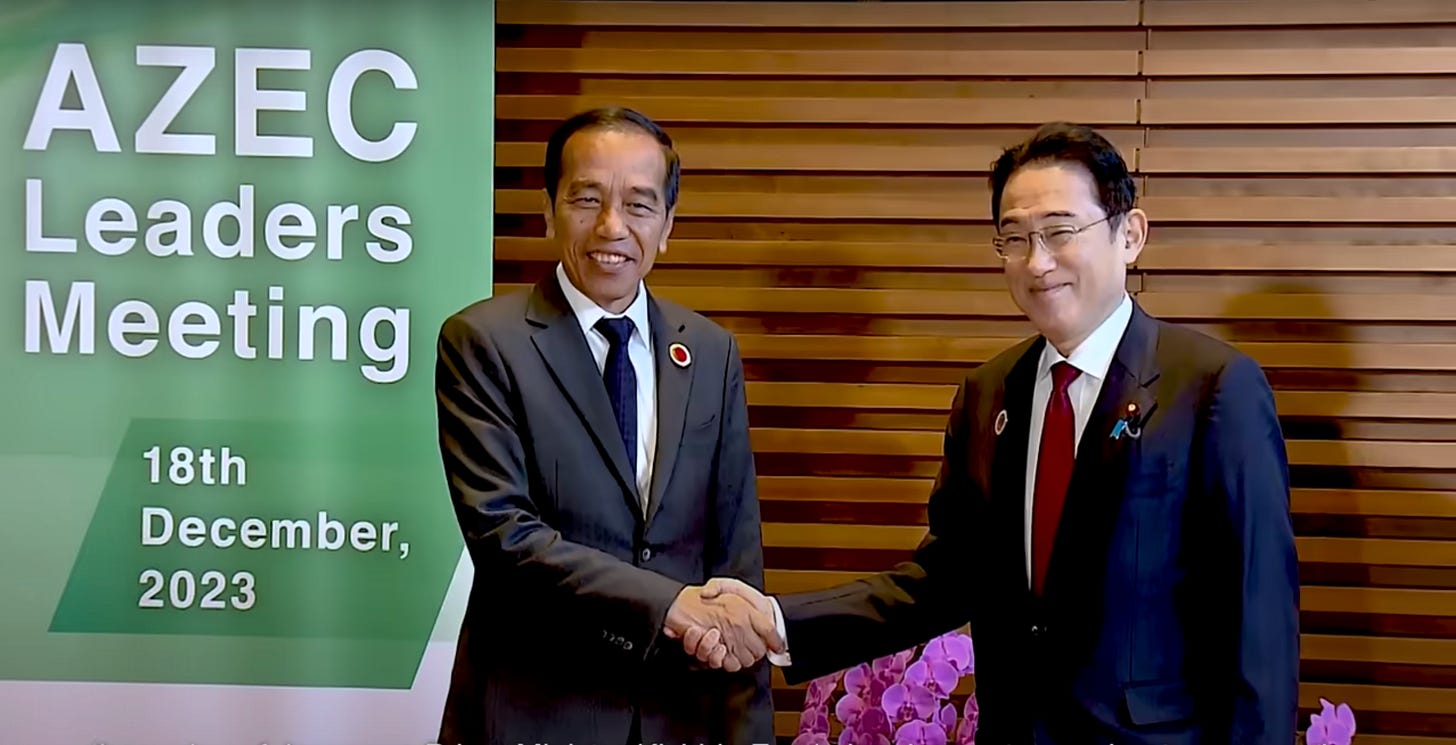Keeping China at Arms Length
“The days when it was easy for Japan and China to cooperate in the fields of energy and decarbonization may be over.”

“The days when it was easy for Japan and China to cooperate in the fields of energy and decarbonization may be over.”
Provocative quote, isn’t it?
Little-noticed because it appeared at the end of the year, a perceptive commentary in Nikkei Asia foretells of a growing but nuanced competition between Japan and China over the future of Asia’s energy transition.
Penned by Nikkei staff writer Takahashi Toru, the piece teases out the future of the Asia Zero Emission Community (AZEC), a Japan-led energy transition initiative that’s made up of Japan and ten Southeast Asian countries.
Three takeaways from the piece for me were:
Japan and AZEC are held in high esteem in the region;
AZEC will continue to grow and morph in keeping with the region’s geopolitical circumstances;
But China will NOT be included. Instead, the dance between Japan and China in the energy domain (among others) will become increasingly complex, characterized by Japan’s preference for bilateral cooperation more than cooperation in multilateral arrangements.
First of these takeaways is something I’ve heard in my own interviews for some of the pieces I’ve written for Energy Tracker Asia and Climate Home News. It’s that Southeast Asian leaders and regional bodies like the Asian Development Bank see AZEC as an important pillar in the region’s climate mitigation and adaptation efforts:
**"**For climate resilience, as well as things like the energy transition, Japan has a lot to offer," said Ramesh Subramaniam, director general and chief of the sectors group at the Asian Development Bank. "[AZEC] is a prominent initiative ... and it's gaining momentum." Subramaniam notes that AZEC often features in climate-related discussions among member countries. Although the ADB remains cautious about funding decarbonization technologies that could prolong the use of thermal power, he commends Japan's proactive approach to decarbonization.
Subramaniam’s statement quoted in the Nikkei Asia piece comports well with the survey results of Southeast Asian sentiment that I wrote about a few months ago:
Rising Sun
Most countries in Southeast Asia now hold Japan in high esteem when it comes to climate leadership, climate innovation, and knowledge sharing.
The second takeaway about the future growth and internal debate within AZEC over its membership is fascinating. It shows that Japan and AZEC members are, naturally, very sensitive to the political situations within countries and across the region, and how these might impact the stability and longevity of the AZEC initiative.
Although the AZEC initiative mainly targets projects within ASEAN, the deliberate use of "Asia" rather than "ASEAN" in its name is significant. "The immediate intention is to bypass Myanmar under its current military regime, while the long-term goal is to allow for potential expansion in the future," said a source familiar with the matter. The scope of the initiative has already sparked debate, with some in ASEAN pushing for Myanmar's inclusion, while some in Japan have proposed bringing India into the group, the source said.
Third, there’s an intricate dance between Japan and China over who will exert how much influence over the region in what domain and in what form.
Notably absent from the list of potential participants is China … ASEAN already has extensive economic ties with China and cooperates with it through Beijing's Belt and Road Initiative. The strongest opposition to China's participation in AZEC comes from Japan. "Frankly, we do not want China to be involved, as it could risk overshadowing our efforts," said a Japanese official. "We want to ensure that Japan plays a leading role in shaping and guiding AZEC."
The piece goes on to say:
Japan's eagerness to exclude China from decarbonization efforts in Asia reflects a decisive shift in the power balance between the countries, as well as a deepening of global divisions. The question now is whether China will allow Japan to assert its leadership in this important sector.
But also importantly, it observes that Japan is willing to play nice with China on a bilateral basis. Referring to the Japan-China Energy Conservation and Environmental Forum, which held its 17th meeting in November 2024, it notes that the event:
attracted around 650 attendees from China and Japan, resulting in the signing of 27 business cooperation deals. At the meeting, Japanese Economy Minister Yoji Muto said, "We aim to use Japan-China cooperation as an impetus to drive global decarbonization efforts.”
The relative influence of Japan and China across Asia — in energy, climate, and all other domains — is a dynamic that the West shouldn’t ignore.
There are countervailing forces that make this dynamic hard to predict. One of the lessons from COP29 was that large developing countries — including those in South and Southeast Asia — are growing ever more wary of the wealthy nations for pushing a renewables-centric decarbonization pathway while being unable to agree on a meaningful support for this very same pathway. China and its clean energy manufacturing prowess seem to them a better ally.
At the same time, the threat of Trump tariffs on China and China’s cooling economy is sending signals to Southeast Asia that depending on China for economic and diplomatic leadership may be a risky proposition after all.




